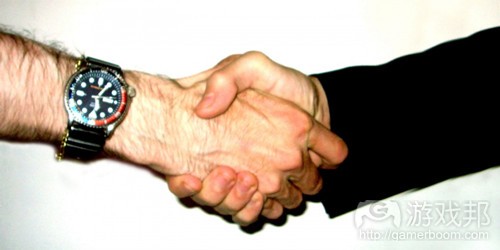游戏开发者应正视发行3.0的作用
作者:Andy Payne
快速检查一个通用的在线词典定义,你会看到像“准备发行书籍,杂志或音乐进行销售的公司或个人”这样的答案。好吧,这一词典可能太早旧了,再把游戏添加进去的话,你会发现所有的游戏开发者都在准备发行自己的游戏。
游戏开发者并不需要发行商。在相连接的全球数字市场中,信息传递者的数量日趋减少,这真的是件好事。即使还存在信息传递者,这些传递者也比过去更容易接触到。访问这些市场是全天候的工作,并且从来都不是件简单的任务——的确,终有一天将会出现许多地方能够让人们轻松获得游戏,也就是开发者将能够更轻松地面向世界市场发行游戏。
任何人都可以做好发行游戏的准备。按照字面来看真的是任何人。
但仍有些游戏开发者会选择与发行商合作,并不是因为他们需要这么做,而是因为他们想要这么做。在我看来,他们将这样的合作当成一种合伙关系,并把发行商提供的内容看成一种服务。对于我来说,这便是发行3.0。
需要慎重申明的是,我将发行2.0当成是独立发行,而1.0则是一种老式的内容,即见证了大多数开发者“销售”他们的IP并获得一些版税。1.0,2.0和3.0是能够在世界上共存的。并不存在“唯一的方式”。我敢保证不久之后便会出现4.0。
制作者和销售者之间的关系应该是公开的,透明的,且建立在信任的基础上。这里不应该存在黑魔法,特殊的调料或胡扯的内容,这是关于协作,是应该随着时间的发展不断发展的关系。这两个团队应该彼此学习共同发展。的确这一方法将对玩家产生影响,我们也期待着它能够变得更加强大且更加重要。
他们的关系还应该是双赢的。这不应该是基于财政因素和条款。毕竟这并不是文艺复兴般的支持,而是一种基于团队的合作。
在我们看来,游戏的知识产权应该归属于游戏的创造者,除非存在一个非常合理的理由去反驳它。也许游戏是基于非常受欢迎的授权,也许有些人想要花大钱去购买游戏的知识产权。不过在全新的游戏发行世界中,我们的首要原则便是知识产权必须归属于创造者。
从操作上来看,你必须做好要干苦活的准备,不能时不时就调整下日常开支,除非这么做能够赚钱并得到认可。值得信赖的特殊风格的帮助者关系是值得珍惜的,但这并未超越任何游戏开发者可触及的范围。与其他开发者交流并进行试探。在决定合作对象时,名誉,风格和讲话的语调都是必要的观察元素。你应该花时间多做点功课。
在数字世界中,这是关于我们准备好一起进行什么样的冒险,而不是我们可以通过销售预测期待什么。发行商的销售团队联系零售买家并询问数字而添加到发行第一天的电子数据表中的日子已经一去不复返了。你的游戏需要用户,粉丝和忠实玩家,你必须清楚这点。永远不会改变的事实是任何东西的创造者都必须前往消费者所在的地方向其出售产品。如今在数字世界中,这一原则所处的位置比以往的任何时候更高。
在Mastertronic中,我们拥有自己的服务文化根源。如果我们未能留心合作者的最佳利益,未能喜欢他们的游戏并高声为他们及其作品而呐喊,这便是不尽责的表现。我们的座右铭是“1+1>2”,这一道理深深地嵌入我们的DNA中。也许我们不可能一直都做到这点,但只要保持着开放的态度并坚持“随时待命,永远在线”的方法,我们便能够继续帮助别人创造出巨大的游戏成功。
(本文为游戏邦/gamerboom.com编译,拒绝任何不保留版权的转载,如需转载请联系:游戏邦)
Publishers: who needs them?
By Andy Payne
No one does.
A quick look at a generic online dictionary definition and it says something like ‘a company or person that prepares and issues books, journals, or music for sale’. Okay, that dictionary must be a bit old, but add games in to it and you get the picture. All games developers are preparing their titles for sale after all, aren’t they?
Games developers just don’t need publishers. In a global digital world of connected markets, there are fewer and fewer gatekeepers and that is a really good thing. And even if there are gatekeepers, these gatekeepers are far more accessible than they ever used to be. Access to these markets is 24/7 and it has never been easier – indeed, there are so many places people can get games it’s never been easier to release a title worldwide on one day.
And that’s it, really. Anyone can make their game ready for sale. Literally anyone.
But some games developers may chooseto work with a publisher not because they need to, but because they want to. In my view they should view this as a partnership and the things a publisher provides should be seen as a service. For me, this is publishing 3.0.
For the record, I see publishing 2.0 as self-publishing, and 1.0 was the old style stuff that saw most developers ‘sell’ their IP and get few roll on royalties. 1.0, 2.0 and 3.0 can and will co-exist in the world. There is no ‘one and only way’. I am sure 4.0 will be along soon enough.
The relationship between the makers and the sellers – that is ultimately how I see it – should be open, transparent and above all trusting. There should be no dark arts, no special sauce, no bullshit. It is about collaboration and co-operation and the relationship should grow over time. Both teams should learn from one another and build together. Indeed this approach should flow into the players and we are seeing this happen and it will only get stronger and more important.
The relationship should also be mutually beneficial. It should not be based on a financial set of considerations and terms. After all, this is not Renaissance -style patronage, this is squad-based working.
The Intellectual Property of the game should always be owned by the game’s creator in our view, unless there is a very, very good reason why it is not. Maybe the game is based on a popular licence, maybe someone wanted to buy the IP for an amount that simply was too hard to refuse. Our first principle in the new world of games publishing is that IP should stay the property of those who created it.
Operationally, everything needs to be lean and mean nowadays and no overhead should be justified unless it earns value and respect. A trusted network of special forces style helpers is to be treasured, but it is not beyond the realistic reach of any games developer. Speak to other devs and take soundings. Reputation, style and tone of voice are all essential markers when deciding who to work with. Take your time and do your homework. Beware of flashy pitch decks and wild claims of guaranteed success.
In the digital world, it is more about what we are all prepared to risk together, rather than what we can expect by way of sales forecasts. The days of a publisher‘s sales team reaching out to their retail buyers and asking for a number to plug into a spreadsheet for day one launch are no longer that relevant. Your games need audiences, fans, engagement and above all, they need to be talked about. One thing that will never change is that the any maker of anything must go where the customers are in order to sell them something. In a digital world that principle stands taller than ever.
At Mastertronic we have our roots in a service culture. If we are not looking out for our partners’ best interests, loving their games and shouting loud about them and their creations, we are not doing our job properly. Our motto has always been 1 + 1 > 2 and that philosophy is buried deep inside our DNA. We won’t always get it right, but with an open mind and an ‘always ready, always on’ approach, we have and will continue to help create some great games successes.
Remember, games devs, you don’t need a publisher – just choose one if you want to.(source:develop-online)
下一篇:Riot致力于研究积极的玩家行为








































 闽公网安备35020302001549号
闽公网安备35020302001549号